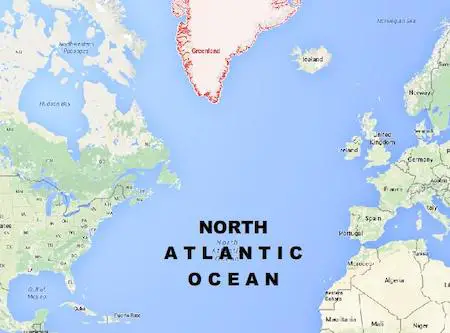The pond refers to the North Atlantic Ocean. Going across the pond refers to travel between Europe (especially the UK) and the Americas (especially the USA).
Across the pond
What's the meaning of the phrase 'Across the pond'?
What's the origin of the phrase 'Across the pond'?
The OED defines a pond as ‘a small body of still water of artificial formation’.
Given that the North Atlantic Ocean is a large stormy body of water of natural formation, there was clearly some irony at work in the naming of ‘The Pond’. We might guess it to be a fairly recent coinage.
In fact, that naming of the ocean came about not all that long after it was first sailed across. Whoever coined the Pond as the name for the Atlantic must have had a more than usually acute sense of irony, the journey across it then being measured in months.
Initially, ‘The Pond’ was the name given to any sea. In 1612 Bishop Joseph Hall called the collective oceans of the world ‘the great pond’ in his religious text Contemplations.
Another 17th century reference to a stretch of sea being called the pond is found in a pamphlet entitled Time’s Alterations, 1642:
Well met, my Lord It seems that you have taken flight over the great Pond, pray what newes in England?
The text is a record of a conversation between two courtiers of Charles I, Lord John Finch and Sir Francis Windebank. Although the text above has been taken by some as the first use of the name the great pond for the Atlantic, this isn’t correct. Neither Finch nor Windebank ever travelled to America. They fell out of favour at the English court and fled to Holland and France. The pond they referred to was probably the English Channel.
Before we get to the Pond we need to take a diversion to an earlier name for the Atlantic – The Herring Pond. This is first used in John Dunton’s Letters from New England, 1686:
Tomorrow if a gale presents we saile on for a new-world (for soe they call America): at my first arrival I’le send an account of the wonders I met on the Great Herring-Pond.
Over time, the Great Herring Pond became shortened to the Great Pond and later the Pond. The first use of this shorter form is found in the Royal Gazette, which was a pro-British newspaper printed in New York by James Rivington in 1780:
Then Jack was sent across the Pond To take her in the rear, Sir.
It may well be that ‘the Pond’ was used colloquially for some time before Rivington was writing but we have no evidence of it. Nevertheless the term ‘across the pond’ has been with us for longer than we might have expected.
The history of “Across the pond” in printed materials
Trend of across the pond in printed material over time
Related phrases and meanings
Browse more Phrases
About the Author

Phrases & Meanings
A-Z
A B C D E F G H I J K L M N O P Q R S T UV W XYZ
Categories
American Animals Australian Bible Body Colour Conflict Death Devil Dogs Emotions Euphemism Family Fashion Food French Horses ‘Jack’ Luck Money Military Music Names Nature Nautical Numbers Politics Religion Shakespeare Stupidity Entertainment Weather Women Work
How did we do?
Have you spotted something that needs updated on this page? We review all feedback we receive to ensure that we provide the most accurate and up to date information on phrases.
